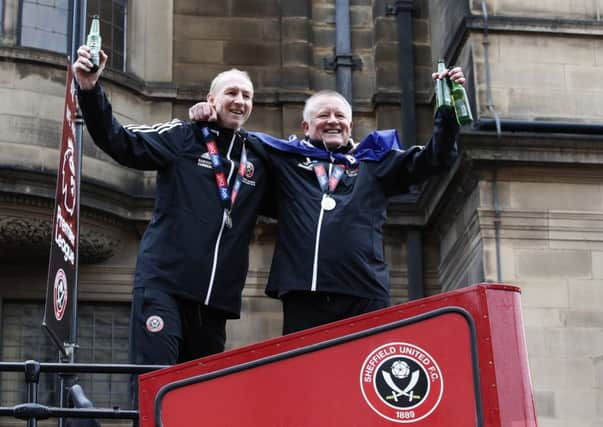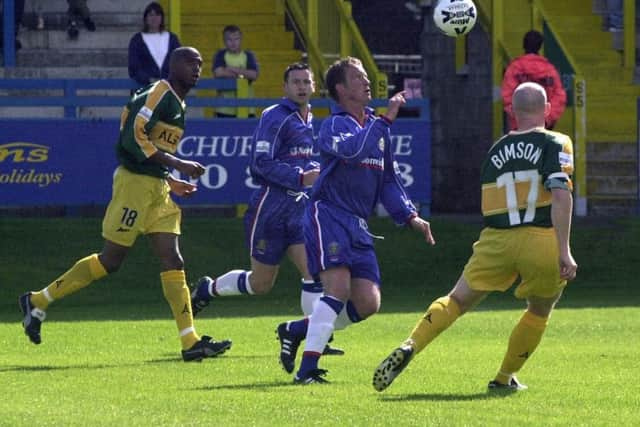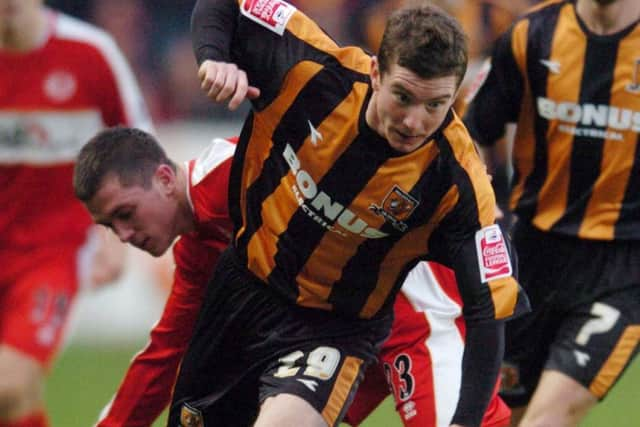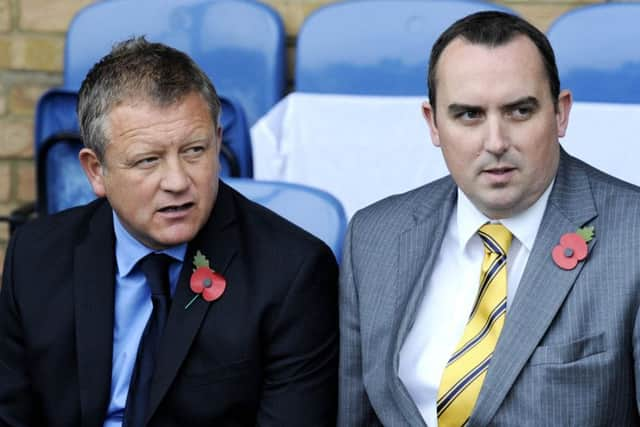Why Chris Wilder has brought success to Sheffield United - by those who know him best


Here, Richard Sutcliffe speaks to those who know the Sheffield United chief best about the journey from Sunday League to Premier League.
Alan Knill - Assistant manager at Sheffield United. Wilder has been in charge at Bramall Lane since May 2016
Advertisement
Hide AdAdvertisement
Hide AdIF someone asks me why Chris and myself work so well together, it can be difficult to pinpoint the exact reasons. We just do.
Both of us have clearly defined roles. We did at Northampton Town and it is the same here at Sheffield United. He is the manager, end of story.
That suits me because, even when I was a manager at Rotherham United and a couple of other clubs, I did the coaching. I wasn’t one for getting anyone else to do it.
To me, the most important thing in terms of our working relationship is that we both have the same ideas as to how we want a football team to play.
Advertisement
Hide AdAdvertisement
Hide AdWe did not know this was the case until Chris came to Bury as my assistant in 2008. We had been together as players at Southampton and kept in touch but Bury was our first time coaching together.


Halifax had just gone bust and Chris looked really tired after being manager for six years. I said, ‘Come and have a rest from management, be an assistant’.
I knew it would not last. Chris was always going to go back into management. He wants to be the number one and it suits him. But, at the time, he needed a breather.
There were some good players at Bury and the team was going okay. But when Oxford came in and offered Chris the manager’s job, it was an easy decision. I said, ‘Just go’.
Advertisement
Hide AdAdvertisement
Hide AdWe got back together at Northampton in January, 2014. Me as his assistant this time. I had found the role that made me most comfortable.


Chris lets me do what I like on the training pitch. We talk about it, of course we do. But he trusts me to get on with it. We work well together, as do all the staff at Sheffield United.
I am not that close with the players. But I am close when it comes to work, in terms of what we need to change or if we have to show them clips of things that need improving.
Likewise, if they are doing something right and that needs reinforcing. We analyse every game and ask ourselves what needs doing better. That is my relationship with the players.
Advertisement
Hide AdAdvertisement
Hide AdIn the changing room, Chris is the main voice. I do have my say after him. But we will have got together beforehand and decided what message needs getting across, meaning I can just come in on the back of him. Usually, my role is to reinforce what the manager has just said.


Socially, we do not see a lot of each other. Obviously, we saw a lot of each other in the week or so after promotion. There were a lot of nights out. But, as a rule, we do not socialise with each other very much at all.
It works very well. Someone once told me Eddie Howe and Jason Tindall at Bournemouth are the same. Not that close socially but clearly both in tune with the other’s thinking.
If we were in each other’s pocket every day, we would be talking about the same things. Instead, when we come together, it is mostly football we talk about. Other stuff doesn’t really feature. This is our job. Anyone who goes to work talks about work to their workmates. For us, that means tactics, formations, preparations.
Advertisement
Hide AdAdvertisement
Hide AdPeople ask a lot about how we set up the team. It is something that has evolved over our years together. At Northampton, we played 4-2-3-1 at first but then if we were losing the shape would switch to 3-4-1-2.
Three games in and we had not won one ahead of Gillingham away. We already had a shape in mind but Chris walked in and said, ‘We are going with 3-4-1-2’.
It just suited the players. The centre halves did not do what they do here. But the more we played it, the more we liked it.
We came here and every opposition team seemed to sit in, particularly at Bramall Lane. They would have eight behind the ball and the only way to overload was the two wide centre halves.
Advertisement
Hide AdAdvertisement
Hide AdTo be honest, the players took some convincing at first. I remember us losing 4-1 at Walsall, when we got counter-attacked four times. The players were not sure at all with the system but the manager said, ‘No, this is how we play’. And that was that.
We have tweaked things along the way. The wing-backs have more freedom now and can join in higher up the pitch with each other.
Also, we have had – and I don’t mean this horribly – better players this season to make it work even better. David McGoldrick sees things others maybe do not, which opens up space. We also allow Mark Duffy to go wherever he wants. If we play the system well, it can be difficult to stop.
The fans have been great, singing both our names in the same chant. I find that humbling.
Advertisement
Hide AdAdvertisement
Hide AdGenerally, I like to keep out of the way, and just get on with my work. That is me. Even when I was a manager, I wanted to let my work speak for me. A quiet life is what I prefer. But Chris insisted I join him on the pitch after Ipswich. Great memories.
As for next season, nothing will change in the Premier League. Certainly not in terms of our approach. We were the same after coming up to the Championship in 2017.
There is a danger you look at the teams and the shirts in the Premier League, the names on the back and so on, and feel a bit scared. But we are not like that. It is 11 versus 11.
Of course, we know things will be different. For four seasons at Northampton and now Sheffield United, we have won pretty much every week. That will change next season.
Advertisement
Hide AdAdvertisement
Hide AdBut our approach will not change. We will attack the league. Play the way we want to play and maintain our identity. A team must have an identity in the Premier League because it will test you to the limit.
Don’t change from what has made you successful in the first place. Sure, you might have to tweak things against different opposition. But our ethos is if we can go forward, we go forward.
Ian Whitehorne: Joint-manager with Wilder at Bradway FC in the Imperial and Meadowhall Sunday League
EVERYONE has to start somewhere and Chris’s first steps in coaching came in Sunday League with Bradway FC.
Advertisement
Hide AdAdvertisement
Hide AdThose mornings in the Imperial League and the Meadowhall Sunday League are probably as far away as you can get from the Premier League.
But I look at the Sheffield United team that has won two promotions under Chris and I see the same kind of spirit we had at Bradway.
There were better players than us back then in the league but we won everything. Chris was the reason for that, as he brought the organisation from the professional game – he was still a player at the time – that meant we always seemed to find a way to win. Just like United for the past three years.
We have been friends for a long, long time and were co-managers at Bradway. But Chris saw things that never even occurred to me.
Advertisement
Hide AdAdvertisement
Hide AdHe was so driven. Chris could not go out on a Thursday and Friday because he was playing on the weekend. So, he would come round our houses and plan everything.
These were lads paying subs every week to play but Chris demanded total commitment. We only trained a couple of hours a week but he wanted it to be like a game. No-one was allowed to hold back. ‘You can’t turn it on and off like a tap,’ was how he saw it.
Chris could be ruthless, too. If someone was not good enough, we had to get someone better in. That is why the team got better and better.
We did the treble one season. We won the Meadowhall Premier League, the Meadowhall Cup and the Sunday Cup for all of south Yorkshire. As far as I know, no-one else ever did it.
Advertisement
Hide AdAdvertisement
Hide AdHis team-talks in the dressing room were brilliant. He also loved a laugh. There was one Cup final at Bramall Lane. It was 1-1 or 0-0 and we were almost up to 120 minutes.
Chris looked across at the other dugout and saw their manager – Paul Mitchell, as it happens, who is now United’s head of recruitment – writing out the penalty takers.
Chris turned to me and asked for a pen. But could I find one? No. Anyway, as we were laughing at how naive we looked without a pen, Chris Dolby – who played for Rotherham and Bradford – got the ball on halfway, beat three or four players and pinged it in the top corner.
Kelvin Thomas: Chairman, Northampton Town. Wilder in charge from January 2014 to May 2016. Also Oxford chairman
Advertisement
Hide AdAdvertisement
Hide AdNOT many chairmen join their manager at a derby match involving their boyhood team but Chris took me to Hillsborough once in the away end and it was definitely an experience.
We had to get a bus from Bramall Lane due to police restrictions, myself and Andy Melville making the trip. We were all at Oxford at the time, where I had appointed Chris in December, 2008.
Our relationship clicked straight away and I was always impressed with his attention to detail, plus a hunger to succeed.
By the time we were reunited at Northampton after our takeover in 2015, I could see his management style had matured. He still had that attention to detail and desire.
Advertisement
Hide AdAdvertisement
Hide AdBut, on the coaching side, he was a little less hands-on. He allowed his assistant, Alan Knill, and (head of sports science) Matt Prestridge a bit more freedom.
I felt that was a beneficial change, as Chris’s real strength is in dealing with the players. He creates just the right environment for them to do their jobs. That was obvious from watching how he worked at both Oxford and Northampton.
Chris also knows his own mind. He left Oxford in third place to take over at Northampton, who were rock bottom of League Two. A very, very brave decision that maybe a lot did not see the logic in.
But Chris did it anyway and justified the move by keeping the club in the League. I had left Oxford in 2012 but we had kept in touch. We spoke quite a bit at the start of our interest in taking over Northampton.
Advertisement
Hide AdAdvertisement
Hide AdAbout a week before the takeover finally went through, Chris had an offer from another League Two club. We talked about it and I was honest. I could not promise the takeover would go through or not so felt he had to make the decision himself.
What I also knew is Chris has strong principles and I was confident he would not walk away. Thankfully, he stayed and then made a really impassioned speech live on radio after a win at Notts County that, basically, helped push the takeover over the line.
Once in charge, we managed to provide Chris with a few quid for the January window and the team really pushed on from there to win the League Two title.
It proved Chris’s ability to thrive in circumstances where other managers would struggle.
Advertisement
Hide AdAdvertisement
Hide AdMickey Lewis: Assistant manager, Oxford United. Wilder in charge from December 2008 to January 2014
CHRIS took the club by storm when he first arrived. Oxford United was in a place where it should not really have been and Chris could see that.
He was like a whirlwind and there was no settling in period. He had very strong ideas and demanded everything from the players.
Suddenly, there was an intensity to things we just had not had before. Before Chris arrived, I felt I worked hard and hoped others felt the same. But Chris inspired me to work even harder.
Advertisement
Hide AdAdvertisement
Hide AdEverything was full on, 24/7. He would ’phone me all the time with ideas. I fed off his enthusiasm. That is the effect he had on everyone.
Not just the players but the staff at the club, too. Of course, there will be some who do not fancy that way of working. One or two did not survive but, really, they are not the characters you want to take along with you.
I had been involved with Oxford for quite a few years by 2008 and Chris was just what we needed. He ruffled a few feathers but, again, the club needed that.
Once he had settled in after a few months, everyone was left to get on with their jobs. Chris still drove us all forward but the standard had now been set.
Advertisement
Hide AdAdvertisement
Hide AdWe were 16th in the Conference when Chris took over and won promotion 18 months later. We were then there or thereabouts in the League Two promotion race.
Chris always felt we needed a few additions in January but the club just could not do it. That is not a criticism, just a financial reality. We never had the biggest budgets because the club did not have the money. To me, that just makes the job Chris did at Oxford even more impressive.
Lee Butler: Assistant manager, Halifax Town. Wilder in charge from July 2002 to June 2008
Chris got the manager’s job a few weeks after Halifax Town had been relegated from the Football League in 2002 and the club was really struggling.
Advertisement
Hide AdAdvertisement
Hide AdThat first year at The Shay was really tough and yet Chris just got on with it. We would be training up on the moors above Halifax, literally having to clean the dog s*** away to train.
Later, the club managed to get us a proper training base in Keighley. It was a lot better. There was an Astroturf pitch and a small building we could use.
It still wasn’t exactly ideal. ‘Lunch’ was a cup-a-soup – the physio would bring in five or six boxes – and a slice of bread. If we were really pushing the boat out, the lads could have toast.
We actually had three spells together at Halifax. The first was in 1999 as players. We travelled in together and hit it off straight away.
Advertisement
Hide AdAdvertisement
Hide AdSo, when Chris became manager, he asked me to come back as his assistant manager. I stayed a year and then came back again the season we got to the Conference play-off final.
Those days were a great grounding in management for Chris. If he could cope at Halifax, he could cope anywhere.
Back then, Chris used to say trying to win promotion was like being asked to, ‘Win Formula 1 in a Ford Escort’.
But he almost managed it. We were 2-1 up in the 2006 play-off final against Hereford United with 10 minutes to go only to lose in extra-time.
Advertisement
Hide AdAdvertisement
Hide AdYou can see the size of the problems that Chris had to overcome that season by the fact the club went bust two years later.
The big thing with Chris is he has never changed. And he won’t now. His profile has grown, obviously. I remember going to Headingley to watch the Test match against West Indies a couple of years ago.
United had just won promotion from League One and he was recognised wherever we went. Not just Blades fans but Leeds, Huddersfield, everyone. Chris was no different to previous years at the cricket when no-one had a clue who he was.
The great thing about Chris is he has never changed as a bloke, even with all the success. Back in Sheffield, Chris still drinks in the same s***ty pub he has always drunk in. No-one treats him any differently and he loves that.
Advertisement
Hide AdAdvertisement
Hide AdRyan France: Played under Wilder at NCE Premier Division side Alfreton Town, 2001-02
WE won four trophies in the one season Chris was in charge at Alfreton Town but my Football League debut a few years later for Hull City probably explains best why he has been so successful.
Peter Taylor had offered me a contract after a two-week trial in 2003, and I remember walking into the home dressing room before my Tigers debut to find an envelope waiting for me.
Chris had written this lovely letter, wishing me ‘good luck’ and saying how he always felt I would make it.
Advertisement
Hide AdAdvertisement
Hide AdPeople will look at Chris and see various strengths, such as tactics or recruitment. But, to me, that letter said everything about him as a person.
Chris was not my manager any more but he still went to the trouble to get in touch. That sort of personal touch goes a long way. It is why Chris’s players give him everything they have got. You can see that from how Sheffield United play.
It was the same at Alfreton. I had been at the club a year before Chris arrived. We had a good team but it was only when Chris took over that we started to win trophies.
We won four in his season at Alfreton. And another two the year after under David Lloyd, another great guy who had worked under Chris. The foundations had been put in place by Chris.
Advertisement
Hide AdAdvertisement
Hide AdChris got the best out of me. He does that with players. We trained as we played, which was at 100 per cent. Some weeks when we had a midweek game, we would only train one night but that made no difference. Everything had to be at full-tilt.
I watch United now and they have the same spirit, desire and togetherness as we had at Alfreton. That does not happen by accident. Chris and his staff will work very hard to create that.